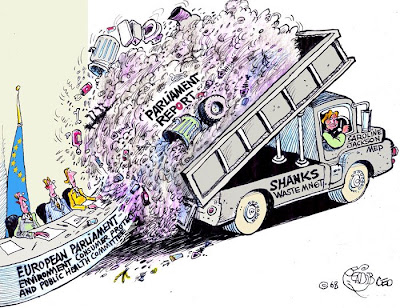http://www.worstlobby.eu/2008/home
Caroline Jackson, Member of the European Parliament
Nominated for her twin roles as an elected representative dealing with environmental issues and as an appointed environmental advisor to a private waste management company, Shanks.
Jackson chaired the Committee on Environment, Consumer Protection and Public Health between 1999 and 2004, and is the UK Conservative Party Environment Spokesperson in Europe. Jackson is paid £6000 as a member of the Shanks environmental advisory board (EAB), a position she still holds.
In 2005/6 Jackson acted as rapporteur for the Waste Framework Directive (WFD), a policy area that clearly interests her private sector employers Shanks plc.

The chair of Shank’s Environmental Advisory Board praised Jackson’s “wide knowledge of European legislation” which it said has “been a benefit to our work”. In the company’s 2006/07 report, Shanks attested “The EC waste framework directive is [...] being revised and as the MEP within the European Parliament responsible for the revision of the Directive, EAB member Caroline Jackson was able to keep us updated on progress during the year. This will have far-reaching implications for waste management and the EAB will consider its impacts on Shanks activities in the UK and mainland Europe.”
Michael Averill, Chief Executive of Shanks, was also the President of the European Federation of Waste Management and Environmental Services (FEAD) until February 2008, which represents the European waste management industry. FEAD ran a ‘consultancy group’ that looked at Jackson’s waste management report and lobbied Jackson three times. So Jackson, as the Rapporteur of a report on the waste framework directive, was lobbied by the industry group headed by the boss of a waste company where she is a consultant!
Despite this rather close relationship Jackson maintains that there is no conflict of interest as Shanks has no interest in incinerating waste. But Shanks website contradicts this, stating that it “remediates PCB and pesticide contaminated soil through high temperature incineration at dedicated facilities in the UK and the Netherlands.”
Vote for Jackson if you are opposed to elected representatives getting too close to private interests and compromising their ability to act in the public interest
Vote here:
http://www.worstlobby.eu/2008/vote/index/worstconflictofinterest
Additional information :
Too Close for Comfort?, Andy Rowell, Spinwatch, July 2008.
About Shanks. Background, Shanks Website, last visited 15 October 2008.
Declaration of Member’s Financial Interests 2007, Caroline Jackson.
MEP on waste company payroll, Andrew Bounds, Financial Times, 13 June 2008.
Safety, Health and Environment Report 2006/2007, Shanks Group.
FEAD Bulletin N°15, June 21 – November 10 2006, European Federation of Waste Management and Environmental Services.
Services. Remediation, Shanks website, last visited 15 October 2008.


